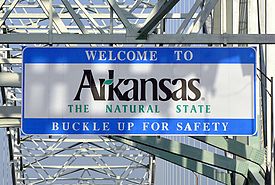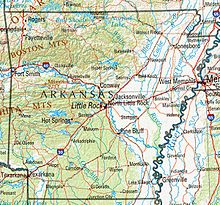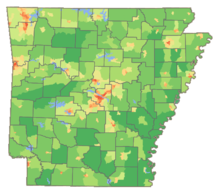Arkansas
![]()
The title of this article is ambiguous. For other meanings, see Arkansas (disambiguation).
Arkansas [![]()
![]() ˈɑɹkənsɔː] is one of the southern states of the United States of America with a population of 2,966,369 (2014). Arkansas' epithets are The Natural State and Land of Opportunity. The state capital is Little Rock. The name Arkansas comes from the French pronunciation of a Quapaw word meaning "land of the downstream people". The pronunciation was officially established in 1881 by a state resolution - based on the pronunciation of French and Italian immigrants.
ˈɑɹkənsɔː] is one of the southern states of the United States of America with a population of 2,966,369 (2014). Arkansas' epithets are The Natural State and Land of Opportunity. The state capital is Little Rock. The name Arkansas comes from the French pronunciation of a Quapaw word meaning "land of the downstream people". The pronunciation was officially established in 1881 by a state resolution - based on the pronunciation of French and Italian immigrants.
Geography
Over time, the Mississippi River formed the eastern border of Arkansas, while between Clay County and Greene County, the St. Francis River shaped the western areas. In many places today, the Mississippi meanders away from its original riverbed.
Arkansas is characterized by mountains, dense forests and fertile plains. The northwest is part of the Ozark Plateau as well as the Boston Mountains; the south includes the Ouachita Mountains, which are divided by the Arkansas River. The southern and eastern areas of Arkansas are called the Lowlands. All of the mountains there are part of the U.S. Interior Highlands region-the only major mountain region between the Rocky Mountains in the west and the Appalachians in the east of the United States.
The so-called Lowlands are also known by the name of their regions: Grand Prairie and Mississippi Embayment (see Lower Mississippi Delta Region). The delta of the Arkansas River is a flat landscape that was also shaped by the nearby Mississippi River. Both of the above regions are fertile agricultural landscapes.
The delta region is divided by an unusual geological structure, Crowley's Ridge. A narrow band of smaller hills between 65 and 170 m high crosses the plain as a division. These hills were probably originally an island between the Mississippi and Ohio Rivers.
Arkansas has a large number of natural caves, such as Blanchard Springs Caverns, and has the only natural deposit of diamonds in the United States near Murfreesboro. The highest point is Mount Magazine in the north of the state at 839 meters.
Worth seeing are Hot Springs National Park and Blanchard Springs Caverns, a stalactite cave of national significance.
Neighbouring countries
Arkansas' eastern border is the Mississippi River, which separates Arkansas from Tennessee and Mississippi. To the south, Arkansas borders Louisiana, to the west Texas and Oklahoma, and to the north Missouri.
Structure
The US state of Arkansas is divided into 75 counties (districts).
See also: List of counties in Arkansas
Climate
Arkansas is characterized by a humid temperate subtropical climate, bordered by the humid continental climate of the northern highlands. Although the state does not directly border the Gulf of Mexico, it still lies within its climatic sphere of influence. In general, the climate is characterized by very hot and humid summers and dry and mild winters. In Little Rock, for example, average summer temperatures are around 32 °C and winter temperatures around 10 °C. Annual precipitation ranges from 1000 to 1500 millimeters, with local variations, and it is somewhat drier in the south than in the north. Snowfall is quite common, but with an average of 13 centimetres it is not very productive.
Despite its subtropical climate, Arkansas is known for its extreme weather in places: Located between the Great Plains and the Gulf of Mexico, it records up to sixty thunderstorms a year. As part of Tornado Alley, tornadoes do occur in Arkansas; some of the strongest tornadoes have hit the state. However, Arkansas is far enough from the coast to escape the direct effects of Atlantic hurricanes. In contrast, the heavy rains of a hurricane system and smaller tornadoes occur more frequently.

Border sign on the Hernando de Soto Bridge near Memphis

Geographic map of Arkansas
Population
| Population development | |||
| Census | Inhabitants | ± in % | |
| 1810 | 1062 | - — | |
| 1820 | 14.273 | 1.244 % | |
| 1830 | 30.388 | 112,9 % | |
| 1840 | 97.574 | 221,1 % | |
| 1850 | 209.897 | 115,1 % | |
| 1860 | 435.450 | 107,5 % | |
| 1870 | 484.471 | 11,3 % | |
| 1880 | 802.525 | 65,6 % | |
| 1890 | 1.128.211 | 40,6 % | |
| 1900 | 1.311.564 | 16,3 % | |
| 1910 | 1.574.449 | 20 % | |
| 1920 | 1.752.204 | 11,3 % | |
| 1930 | 1.854.482 | 5,8 % | |
| 1940 | 1.949.387 | 5,1 % | |
| 1950 | 1.909.511 | −2 % | |
| 1960 | 1.786.272 | −6,5 % | |
| 1970 | 1.923.295 | 7,7 % | |
| 1980 | 2.286.435 | 18,9 % | |
| 1990 | 2.350.725 | 2,8 % | |
| 2000 | 2.673.400 | 13,7 % | |
| 2010 | 2.915.918 | 9,1 % | |
| Before 1900 1900–1990 2000 | |||
Arkansas is home to 2,915,918 residents (as of the 2010 Census), of which 74.5% are white, 15.4% are African American, 6.4% are Hispanic or Latino, 1.2% are Asian American, and 0.8% are Native American. There are 1,132,488 households.
Religions
Major religious denominations in 2000: 665,307 Southern Baptist Convention, 179,383 United Methodist Church, 115,967 Catholic Church. There are many other denominations, mainly Protestant.
Age and gender structure
The age distribution of Arkansas is as follows:
- up to 18 years: 693,036 (24.7 %)
- 18 to 64 years: 1,728,976 (61.5 %)
- 65 years and older: 388,860 (13.8 %)
The median age is 37.1 years. 51.0% of the population is female and 49.0% male.
Ancestry
In 2014, 11.2% of residents were of Irish descent, making it the largest group. This is followed by American (10.7%), German (10.6%), English (9.6%) and French (1.9%).
Largest cities

- List of cities in Arkansas

Population density
Questions and Answers
Q: What is Arkansas?
A: Arkansas is a state in the United States of America.
Q: What are the nicknames of Arkansas?
A: Arkansas is nicknamed the Land of Opportunity or The Natural State.
Q: What is the capital city of Arkansas?
A: The capital city of Arkansas is Little Rock.
Q: How many people live in Arkansas according to the U.S. Census Bureau in 2015?
A: According to the U.S. Census Bureau in 2015, around 2,978,204 people live in Arkansas.
Q: What is the significance of Arkansas being nicknamed the Land of Opportunity?
A: The nickname Land of Opportunity implies that Arkansas has many opportunities for growth, development, and success for its residents.
Q: What is the significance of Arkansas being nicknamed The Natural State?
A: The nickname The Natural State implies that Arkansas is rich in natural resources, wildlife, and beautiful landscapes.
Q: Is Arkansas part of the United States of America?
A: Yes, Arkansas is a state in the United States of America.
Search within the encyclopedia